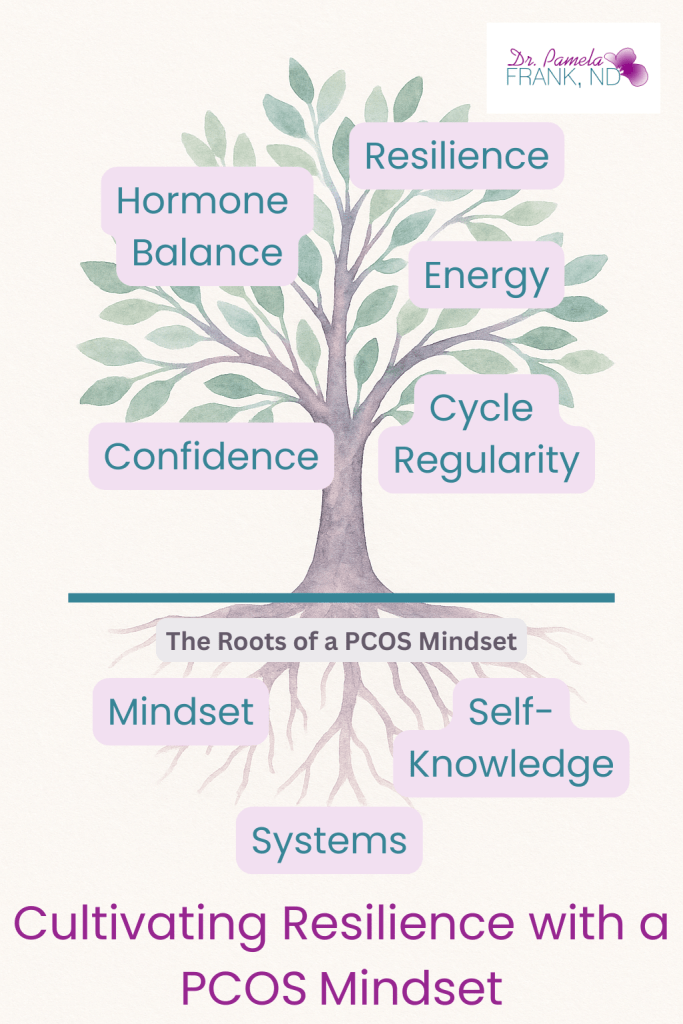Living with Polycystic Ovary Syndrome (PCOS) can be an emotional rollercoaster. Between unpredictable symptoms, confusing lab results, and constant lifestyle adjustments, it’s no wonder many women feel like they’re fighting their own bodies. One month, you might feel on top of things, with good energy, your skin looking better, and your cycle seeming more regular, and then suddenly everything shifts again.
If that sounds familiar, you’re not alone. PCOS is a lifelong condition that requires ongoing care and flexibility. What truly helps women thrive with PCOS isn’t just the proper diet or supplement protocol; it’s resilience.
Resilience is the ability to adapt, recover, and move forward, even when progress is slow or setbacks occur. It’s about having the mindset, systems, and self-knowledge to make choices that support your body, not punish it.
Let’s unpack what that means and how to build it.
1. The PCOS Mindset: Redefining Progress and Control
Mindset is the foundation of resilience. For women with PCOS, it starts by reframing how we define success and progress.
Much of the conversation around PCOS revolves around control: controlling weight, controlling blood sugar, controlling hormones. But the truth is, you can’t control your biology as easily as you might control your schedule or your to-do list. Hormones respond to a complex web of factors, including sleep, nutrition, stress, inflammation, and even your mental state.
Instead of striving for control, focus on influence. You can influence how your body functions through consistent, compassionate action.
Try shifting your language from:
- “I have to fix my hormones.” → “I’m learning what supports my body best.”
- “I failed because I slipped up.” → “I’m experimenting to see what works and what doesn’t for my body.”
This simple shift reduces guilt and creates space for curiosity, which is far more productive than self-criticism.
A resilient mindset acknowledges that progress is rarely linear. You may experience improvements in sleep and energy before changes in cycle regularity or skin. Each small gain counts, and every setback offers data to guide your next step.
Mindset also means challenging the comparison trap. What worked for your friend, sister, or influencer may not work for you. PCOS is incredibly diverse; some women have primarily insulin-resistant PCOS, others have adrenal or inflammatory subtypes. The more you accept your individuality, the more empowered and less frustrated you become.
A resilient PCOS mindset isn’t about perfection; it’s about persistence, patience, perseverance, and self-trust.
2. PCOS Systems: Building Sustainable Habits that Work for Real Life
Motivation is fleeting, systems are sustainable. You don’t need endless willpower to support your hormones; you need a structure that makes healthy choices easier.
Systems are routines, habits, and environments that keep you grounded when life (and hormones) get unpredictable.
Here are a few simple but powerful systems to help build resilience:
Meal Rhythm Over Meal Perfection
Blood sugar stability is key to controlling cravings, hormone balance, mood, and energy. You don’t need to cook elaborate meals. What matters most is rhythm and consistency.
- Eat every 4 hours to prevent energy crashes.
- Include ample protein, fibre (think fibrous veggies or lentils), and healthy fat at each meal to keep blood sugar steady.
- Batch-cook simple staples like roasted chicken, lentils, or chopped veggies so healthy meals are always within reach.
The goal isn’t a flawless plan; it’s to make nourishing choices the default, not the exception.
Movement that Fits Your Energy
Exercise is vital for PCOS, but overdoing it can backfire. Intense workouts every day can raise cortisol and worsen inflammation or irregular cycles. Instead, create a flexible framework that adapts to your body’s signals:
- Cardio or interval training on high-energy days
- Walking, Pilates, or yoga during PMS or low-energy phases
- Rest or gentle movement one or two days per week when your body asks for recovery
When movement is guided by self-awareness rather than pressure, it becomes a long-term habit rather than another stressor. Variety in workouts helps prevent boredom or overtraining.
Simplified Tracking
Tracking can be empowering or overwhelming. Many women fall into the trap of monitoring every symptom, meal, and mood, which can create anxiety. Instead, pick one or two markers that give you meaningful feedback.
For example:
- Track your cycle length and flow if your main goal is fertility or menstrual regularity.
- Track energy and cravings if you’re focusing on blood sugar balance.
- Track sleep quality and mood if stress is your biggest trigger.
Tracking is not about control, it’s about awareness. Over time, you’ll see patterns that guide more personalized decisions.
Boundaries Around Energy and Stress
Resilience also comes from managing inputs, not just food and exercise, but also emotional and mental energy.
Set boundaries with:
- Information: Limit how much health content you consume online. Too much advice can cause paralysis by analysis.
- People: Surround yourself with those who support your efforts, not those who minimize your symptoms or lure you into temptation.
- Time: Build rest into your week. Recovery is a hormone-supporting habit, not a luxury.
3. Self-Knowledge: Learning Your Body’s Language
Perhaps the most essential element of resilience is self-knowledge, the deep understanding of your body’s rhythms, triggers, and needs.
PCOS isn’t one-size-fits-all. Some women experience high androgens and acne but have normal insulin levels. Others may have irregular cycles and fatigue linked to inflammation or thyroid imbalance. The key to resilience is learning to read your body’s cues.
Start noticing:
- When does your energy dip and cravings ramp up?
- Which foods leave you energized versus bloated, tired, congested, or foggy?
- How does stress show up in your body – as poor sleep, cravings, and anxiety?
- How does your body respond to different types of exercise?
Journaling or noting observations in a tracking app can help. Over time, you’ll see connections between habits and symptoms, data that’s more powerful than any one-size-fits-all plan.
This process builds body trust, the opposite of what many women with PCOS have been taught. For years, the message has been “your body is broken” or “you need more discipline.” But resilience grows when you see your body as a partner, not an adversary.
Self-knowledge also empowers you to advocate for yourself in healthcare settings. When you can clearly describe your symptoms, patterns, and responses, you become an active participant in your care, not a passive patient. You’ll know when to ask for testing, when to question a recommendation, and when to seek a second opinion.
4. Resilience Is a Practice, Not a Personality Trait
Resilience isn’t something you’re born with; it’s something you build through repetition. It’s the cumulative effect of thousands of small, self-supportive choices.
It’s the decision to pause and breathe when your frustration peaks.
It’s choosing to cook a simple meal instead of ordering takeout.
It’s tracking your cycle without judging your body.
It’s permitting yourself to rest when you need to without guilt.
Over time, these small acts of care form a foundation of strength. You’ll begin to notice that setbacks don’t throw you off for weeks, maybe just a day. You’ll bounce back faster, with more clarity and compassion.
That’s resilience in action.
The Takeaway
Building resilience with PCOS isn’t about being endlessly positive or having perfect habits. It’s about developing the tools to navigate your body’s ups and downs with understanding and confidence.
Having a PCOS mindset gives you perspective, helping you stay curious rather than critical.
Systems give you stability, helping you take consistent action even on hard days.
Self-knowledge gives you power, helping you personalize your path rather than follow trends.
Together, they create a sustainable foundation for long-term hormone health, emotional balance, and well-being.
Your body may not always respond the way you want it to, but it is always responding. With the right mindset, systems, and self-knowledge, you can guide that response in the direction of healing.
Work With a Naturopathic Doctor Who Understands PCOS
If you’re ready to take a personalized, evidence-based approach to PCOS, one that honours your biology, lifestyle, and goals, I can help. Together, we’ll identify your unique hormonal patterns, develop tailored nutrition and supplement plans, and create systems that make sustainable change possible.

